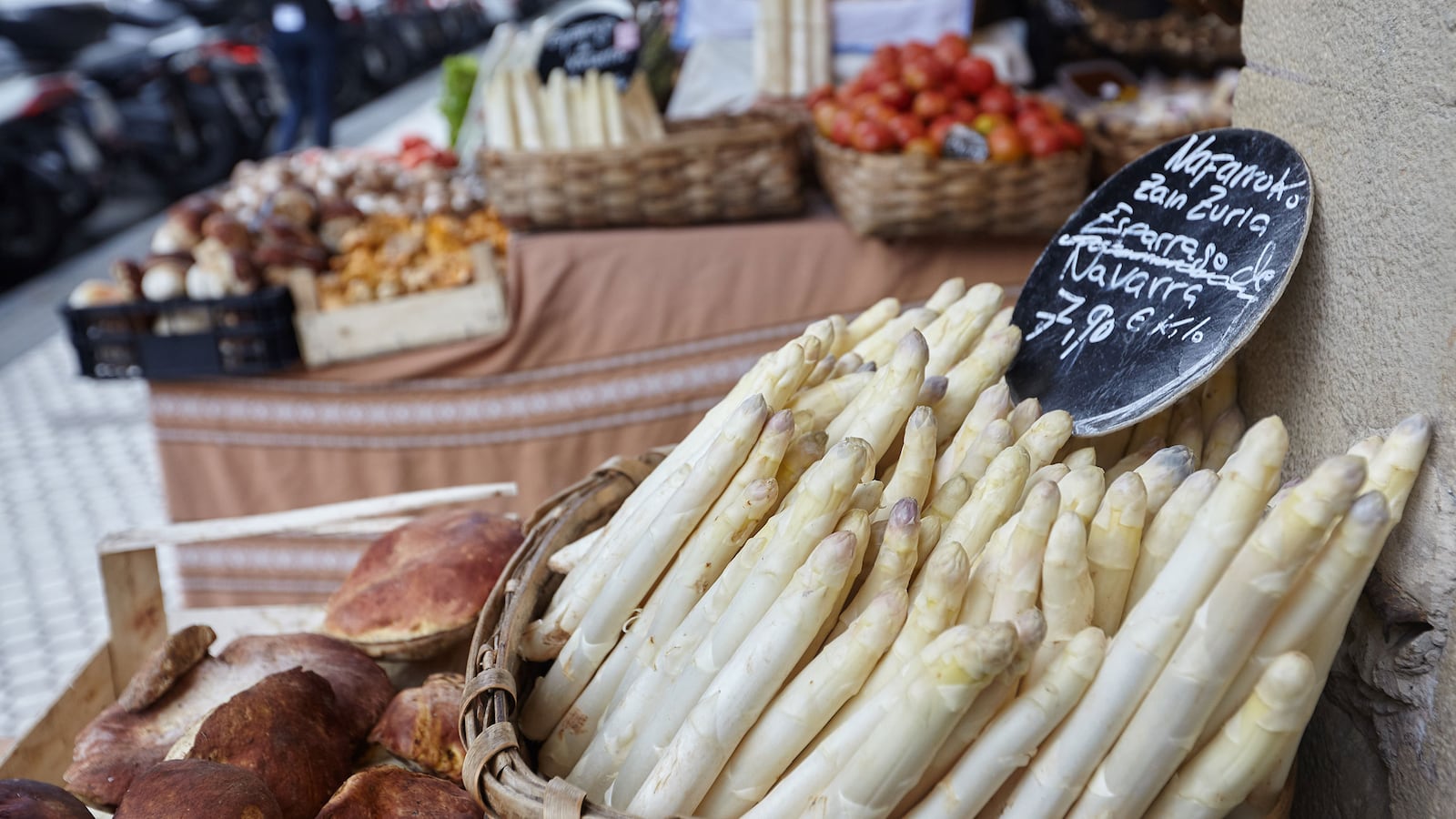From across a wet cobblestone street at two hours to midnight, a few steps past the regal Maria Cristina Hotel in San Sebastian, a wiry man in thick-rimmed glasses whistles at me. He is leaning against a lamp post, smoking a cigarette. Bendur Elizondo is a chef I’d met the night before, and he’s motioning for me to follow him to a nondescript door in a long building a block from the Urumea River. The only clue that we’re headed someplace special is a small plaque to the left of the door that reads, “Sociedad Los Corcones, 1982.” I follow him, clamber down a dingy staircase, and suddenly, I’m in a world from which women once were forbidden.
Elizondo has invited me inside his members-only gastronomic society, one of more than 1,000 private clubs in the Basque Country that aren’t often open to visitors from abroad and one that historically has never allowed women inside, especially not in the kitchen. These are men’s places, havens from their demanding wives in a society where women rule. Until recently, the Basques were happy to keep it that way.

To be allowed in is exhilarating, the experience of tasting something forbidden, like a child sipping wine from a parent’s glass. It took some friendly arm-twisting to get here. I’d enjoyed a meal the night before in a tiny dining room in the basement of my pension, the nearby Casa Nicolasa, which Elizondo calls the “secret spot,” which is not to be confused with a secret society. As he prepared grilled artichoke and seasonal white asparagus with “sea foie gras” (local monkfish liver), I sipped Txakoli and quizzed him about the city’s famous secret societies, which I mistakenly called txokos.
“You want a txoko?” Elizondo says, only glancing over his thick spectacles disapprovingly before returning to his plates of grilled prawns and gazpacho. “Go to Bilbao.” The three other men in the dining room nod in agreement. “We call it a sociedad,” one of the men confirms. Sociedads, they tell me, are where men gather to have their own space, share food and talk about their feelings. “Women rule at home,” Elizondo says of the Basque Region’s strongly matriarchal society. “We go to sociedad to get away. To unpack the backpack.”
I ask the men how a visitor might attend one of these affairs. They glance at each other and shrug. “You have to be invited.” Then, Elizondo raises his eyebrows at me. “You want to go to one?” I nod emphatically, and he returns to his mise en place. “We’ll see how we feel at the end of the meal.” This is an invitation I must earn.

San Sebastian has long been a global food destination. Gastronomes flock by the tens of thousands each year to the city by the sea to crawl its pintxos bars (the Basque version of tapas) situated on every corner and to shell out at the Michelin-starred restaurants that are in higher concentration here than anywhere else in the world. But in Basque Country, secret societies have been the heartbeat of the culinary mecca’s culture since the mid-nineteenth century. The first gastronomic society was recorded in 1870 in San Sebastian, from where they spread throughout the Basque region. These secret societies were important bastions of Basque culture during the Franco regime, when they became the only place Basques could meet without state control, to speak in their native language and discuss politics—activities banned under the new dictatorship. Known as txokos (the Basque word for corner) in other cities, gastronomic societies were historically men-only, but some have recently opened their doors—or maybe left them ajar—for women. At Los Corcones, the 36-year old sociedad that I had just wandered into, women were permitted to attend with a member’s invitation, but never to enter the kitchen.
Elizondo’s girlfriend, Maria, wades through a dozen men to introduce herself. She is one of only two other women in the room, and she seems pleased to enjoy the festivities with no responsibility, casually sipping two-fingered pours of funky-tart local cider with one eye on the televised futbol match, in which her home team is competing. In Basque country, “women are very important,” Maria tells me between gasps and shouts at the tiny screen. From her perspective, women get the better deal: they can enjoy a delicious meal without doing any of the cooking or cleaning. “Sometimes when it’s not busy on a Monday, I’ll go in the kitchen,” she confesses, unbothered. Elizondo chimes in as he scrapes the burnt ends off slabs of toast for pan con tomate, “we love to break the rules.”

At least five men flutter through the large commercial kitchen minding their offering, some dressed like line cooks in stained aprons, others donning slacks and loafers like business men on casual Friday. One man trims what must be a two-kilogram txuleta (T-bone steak), while another fries mackerel fresh from the Bay of Biscay. He struggles to scrape the fish from a pan and Elizondo, one of the few professional chefs of the bunch, scolds him. “He’s destroying it,” he mutters to me under his breath. I stand enthralled at the counter outside of the kitchen, careful not to cross the line. But I had made it this far, and in a cider-induced burst of bravado, I whisper to Elizondo, “if I stay on this side, can I help?” He looks around, then lowers his voice and motions with his eyes to a rack of hanging aprons. “Grab one of those and come in. Quick!”
Ebullient but determined to remain composed, I snatch a rumpled grey apron and, at Elizondo’s direction, begin dipping kokotxa, prized local fish chin, in flour and egg, then dropping it into sparkling oil to fry. Another man rounds the corner to check on his creation and jolts to see me in the kitchen. I freeze, red-faced, and fold my hands into a prayer position, gesturing for his forgiveness. He wags a finger at Elizondo, but taps me on the shoulder as he exits, assuring me it’s all in good fun. The next member to see me slicing garlic for baked monkfish makes the sound of an alarm with his voice: “Beep! Beep! Beep!” We all laugh and my shoulders relax as Elizondo hands me a plate of squid to fry.
The primary role of gastronomic societies is social, but from these gatherings, business opportunities have emerged. In the early 1970s, a group of friends from San Sebastian formed a sociedad while they were on holiday together in Rioja—Spain’s famed wine growing region that straddles the Basque Country to the north and Castilla y León to the south. Tired of buying wine to drink at their sociedad, they began making their own, at first only for themselves, and then to sell in small quantities. Forty-five years later, this endeavor born of a simple love for gastronomy is Beronia Winery, one of Spain’s premier exporters of Rioja wines. Gonzalez Byass, the parent company to Beronia, still credits the sociedad as their reason for being.
For those who don’t happen to befriend a local chef and not-so-subtly request passage into a sociedad, there are lesser known, more straightforward ways to gain entry. My research led me to Bodegas Beronia, the gastronomic society prominently cemented into its origin story, which offers a hosted society experience. I assumed this would be a diluted tourist reenactment of the affair, but I figured I’d brave it, the worst scenario likely being a boring afternoon with mediocre food. To my surprise, my host this time was a woman.

Cristina Ibañez had been a member of Sociedad Hipica, the first gastronomic society in the city to offer membership to women (known as a mixed society), for seven years. She tells me that she joined simply because she loves to cook. “I am a freak of food,” she boasts, a clutch of spring onions in her grip. Still, in this more progressive society, she is one of only 10 females in a membership of 120.
In this experience, I was not only allowed to help prepare the food, it was expected. Armed with a vegetable peeler and a mountain of white asparagus, Ibañez demonstrated the proper way to prepare the stalks and then put me to work while she scurried off to tend her pears poaching with sticks of cinnamon in crianza wine. As I peeled, I spoke to another woman who was decapitating anchovies and removing the guts with her fingers. “I don’t think of it as sexist,” she told me, her hands covered in fish blood. “I think [sociedads] are the invention of the woman. Instead of having men in the house, we send them out.” Ibañez appeared to inspect my work. “No!” She exclaimed, shaking her head. She showed me that I hadn’t successfully removed all the stringy exterior, which would get stuck in our teeth if we ate it. She motioned to her mouth and made an uncomfortable face to demonstrate what I almost put us all through. I apologized and dug into the pile a second time, hoping I hadn’t worn out my welcome. To my relief, my work passed Ibañez’s quality control on the second go-round.
As we began skewering Cantabrian anchovy fillets with guindilla peppers and manzanilla olives—one of San Sebastian’s most classic pinxtos, the Gilda, allegedly named for a similarly spicy character Rita Hayworth portrayed in the eponymous film—additional society members trickled into the underground clubhouse, some in time for the reservations they had scribbled onto little slips of paper and pinned to a corkboard in the dining room, others appearing to be hunting for a reprieve from the surface, nuzzling quietly into a corner alone with a modest plate of food and a pour of crianza. Ibañez floated a gingham cloth atop our table, motioned for me to wash my hands of cured fish, and the feast began: glistening plates of fried chorizo, my white asparagus, boiled with salt and sugar and topped with pepper salsa, whole garlic-laden anchovies, and white fish in lemon beurre blanc. I sipped Verdejo and licked my fingers of pork fat and anchovy oil, understanding now the importance of siesta after a lunch like this.
For female sociedad members like Ibañez, membership is not a political victory, but simply an activity she enjoys. She is pleased to host guests because she gets to do what she loves: cook with the local bounty in a kitchen where someone else cleans up. Societies like hers don’t mind visitors, as long as their visits are arranged according to the group’s rules. Others of a more traditional persuasion frown upon too many interlopers. Elizondo’s sociedad is one of these, but he rolls his eyes at the idea. “I’m not doing anything outside of the policy, but some people don’t like to see foreigners because they think this is their place. Some people.” Despite his cavalier tone, he knows that trust among members is what keeps the region’s beloved gastronomic societies alive. “If you don’t have trust, this wouldn’t be possible. This kind of place goes away.” With feminism dominating the zeitgeist in much of the developed world, the Basque Country remains largely untroubled by gender roles. Gastronomic societies may continue to evolve, but their velocity is that of the region’s general pace of life: natural, flowing, like the changing of the seasons. Elizondo represents one of the progressive ones, but he exhibits no urgency. “Sooner or later, all these policies will change.”





